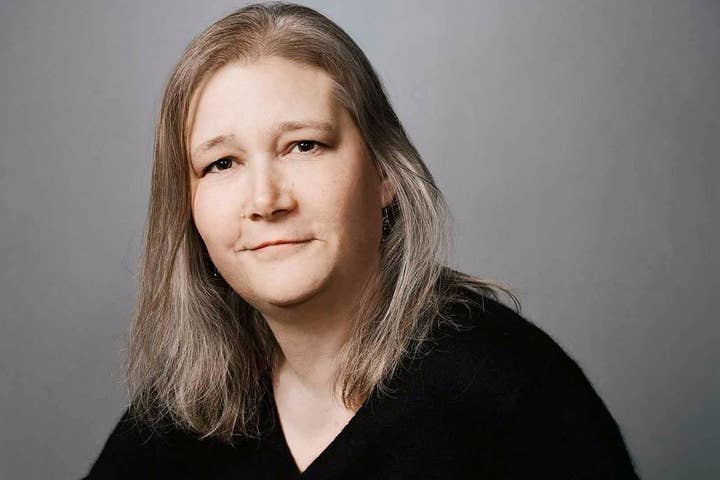"We're definitely at the point where something's gotta give"
Amy Hennig calls AAA development "an arms race that is unwinnable" where crunch is still a big problem
With a CV that includes Crystal Dynamics, Naughty Dog and now Electronic Arts, Amy Hennig has worked in AAA console development for more than 20 years. But reaching that cutting-edge and staying there demands significant personal sacrifice, and Hennig believes the AAA industry has reached the point where, "something's gotta give."
In a long and fascinating interview with Idle Thumbs' Designer Notes podcast, Hennig described the darker aspects of what has otherwise been a glittering career. many think of crunch as a declining problem in the industry, but Hennig's recollections are as recent as Uncharted 3 at Naughty Dog, which launched in 2011.
"I pretty much worked seven days a week, at least 12 hours a day"
"[Uncharted] 3 was hard, because even though we had two years again, it was two years after two projects that were a crunch," she said, referring to the project's development cycle. "And it was a time when we were also trying to grow the studio and split into two teams, and deal with all of the recruitment issues that went into that. And try to figure out what to do in the face of the success of the second game, and still only have two years with all those challenges. It was a tough one."
While not every factor that Hennig mentioned were essential to making Uncharted 3, the need to grow and expand while still meeting a rigid production schedule will be familiar to many AAA console studios. In addition to this, Hennig said, generating new ideas becomes more difficult with each new game, and each new game brings more scrutiny from an ever growing number of opinionated "stakeholders." As a director, and therefore one of the most senior members on the team, Hennig recalled still working on the previous game - "y'know, bug fixing or whatever, writing the strategy guide" - when others were returning from their vacations, "all refreshed and ready to go."
When Soren Johnson, the designer of Offworld Trading Company and the host of the podcast, asked Hennig how difficult AAA development was on a personal level, Hennig replied, "Really hard. The whole time I was at Naughty Dog - ten-and-a-half years - I probably, on average, I don't know if I ever worked less than 80 hours a week. There were exceptions where it was like, 'Okay, let's take a couple of days off,' but I pretty much worked seven days a week, at least 12 hours a day."
"We have to get our act figured out as an industry, and the problem is that the ante keeps getting upped"
And the seven-day working schedule wasn't limited to people on Hennig's level. Johnson posited that weekend work wasn't generally the same, and asked how much of Naughty Dog's team would be present. "A lot of it," Hennig replied. "I mean, Naughty Dog is pretty notorious for the amount of crunch, but obviously in a leadership role you try and do even more."
This is particularly revealing given that, in an interview earlier this year, Uncharted 4 director Neil Druckmann said that crunch partially informed the themes at the heart of the game. Last year, an IGDA survey showed that increased awareness of crunch as an issue hadn't prevented two-thirds of developers from working under those conditions.
While Hennig admitted that she wouldn't change anything that meant she hadn't made games like the Uncharted series, she admitted to having a clearer view of the issue when looking at the experiences of other people. When asked if making AAA games was worth the lifestyle that goes along with it, she replied, "I don't think so."

"There's people who never go home and see their families. They have children who are growing up without seeing them," she said. "I didn't have my own kids. I chose my career in lots of ways, and I could be single-minded like that. When I was making sacrifices, did it affect my family? Yes, but it was primarily affecting me and I could make that choice. But when I look at other people... I mean, my health really declined, and I had to take care of myself, because it was, like, bad. And there were people who, y'know, collapsed, or had to go and check themselves in somewhere when one of these games were done. Or they got divorced. That's not okay, any of that. None of this is worth that.
"There's people who never go home and see their families. They have children who are growing up without seeing them"
"We have to get our act figured out as an industry, and the problem is that the ante keeps getting upped... It's an arms race that is unwinnable and is destroying people."
Nevertheless, Hennig's passion for her work and love for the medium is clear. The question, then, is: "How can we still make games like this in a way that is sane and responsible and ethical? Because we're not doing it right now."
On that front Johnson and Hennig did not arrive at any simple answers. Indeed, their conversation highlights the complicated web of factors that make the escalating ambition and scale of AAA console development seem inexorable: consumer desire for games that push the limits of technology, publishing executives focusing on quarterly financial results, and a developer culture that still venerates Metacritic scores, awards, and even the number of hours worked.
"Are you willing to go longer?" Hennig asked, referring to the dev cycle on a AAA game. "Trying to finish a game like that [Uncharted 3] in two years is insane, especially when you're saying that the two years is everything: pre-production, production, go... Time is a huge one, but then everyone is racing with cost versus time. So could we do it with smaller teams longer? Sure, but then we tend to throw people at these things and burn money fast... We've all seen games that took too long and they kinda got lapped."
The trajectory of AAA console games, Hennig said, is, "to be all things to everyone." However, at a time when new distribution and pricing models have given rise to so much change and renewal, the world in which she works has largely stuck with the same price-point and the same drive for upping the ante.
"Uncharted 1; a ten-hour game, no other modes... you can't make a game like that any more"
"When you go to pitch a game like this, it's like, 'Well it better have this many hours, and you'd better have this mode, and you'd better do this.' Or we could go, 'You know what, we're gonna make the best fucking six hour game you've ever seen. And that's all it is. And could you please make that $40?'
"We're definitely at the point where something's gotta give... And my hope was that different means of distribution, the fact that everything wasn't bricks-and-mortar and in a box, it would be that. And I think in some quarters that's true, but I think for AAA development we're still stuck in that rut, and the ante keeps getting upped.
"I mean, Uncharted 1; a ten-hour game, no other modes... you can't make a game like that any more."
Amy Hennig's interview with Designer Notes is in two parts, both of which are full of insight into her career, game design, and the industry as a whole. You can find them here.









